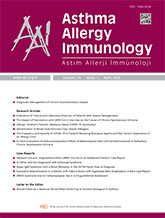


Objective: The effect of biological agents used in severe allergic diseases on the risk of coronavirus disease 2019 (COVID-19) and the course of the disease still remains unclear. The aim of the study was to evaluate retrospectively the frequency and severity of COVID-19 to determine risk factors and to present real-life data in patients using biological agents.
Materials and Methods: Patients who have used omalizumab or mepolizumab for at least six months were questioned retrospectively in terms of a history of COVID-19. Patients with severe acute respiratory syndrome coronavirus-2 (SARS-CoV-2) polymerase chain reaction (PCR) or serological IgG positivity, symptoms, lung involvement, the need for supplemental oxygen, hospital and intensive care admission, and mortality were queried.
Results: Of the 71 patients (omalizumab/mepolizumab: 51/20) included in the study, the average age was 37.2±12.9, and the female/ male ratio was 46/25. Of the 11 patients (omalizumab/mepolizumab: 6/5) with SARS-CoV-2 positivity, two were hospitalized for pneumonia and needed oxygen. However, intensive care was not required and they survived. There was no significant difference between mepolizumab users who had COVID-19 and those who did not in terms of baseline and post-treatment 6th-month eosinophil values (p= 0.7, p= 0.59, respectively). It was established that eosinopenia developing after treatment did not increase the risk of COVID-19 in patients using mepolizumab [RR (95% Cl) 0.99 (0.97-1.02), p=0.88].
Conclusion: According to our single center data, we found the risk of severe COVID-19 in patients using biological agents to be quite low. Especially, eosinopenia that developed after mepolizumab treatment did not constitute a risk factor for the severity of COVID-19.